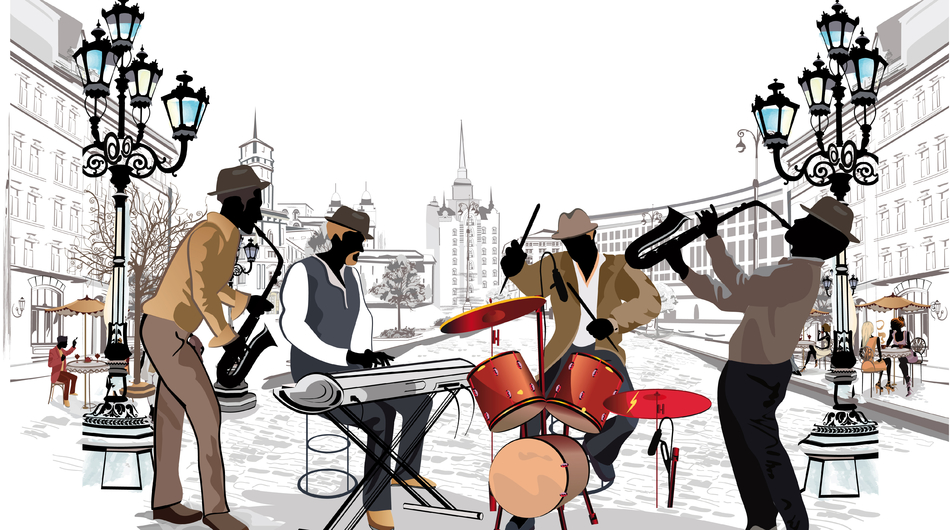
Photo credit: laifalight / 123RF Stock Photo
The name GuitarClub is most likely to be associated with music, gigs, and rock concerts. But don’t judge the book by its cover. This startup has ambitions to beat restaurant-finder Zomato, in terms of pulling footfalls for hoteliers and restaurant owners.
Founders of GuitarClub describe the eight-month-old startup as a platform that seeks to connect upcoming indie artists with real estate spaces like cafes, restaurants, and hotels. It conducts ticketed events that can be bought on their website, just like BookMyShow.
Another event coordinator? Not exactly. GuitarClub has developed proprietary software to automate event management. From record keeping, pricing analysis for each artist, to demand ratings, to venue management, GuitarClub’s software suite aims to help both artists and hoteliers.
Getting past failure
Started in January 2016 as a music discovery platform, much like Gaana and Saavn, GuitarClub was soon butted out by these bigger competitors. The bootstrapped startup did not have the resources to battle the marketing spend of well-funded companies. It drew the co-founders – Pawan Kumar, Siddharth Gandhi, and Aditi Aggarwal – back to the drawing board.
GuitarClub was created to be sturdy after founders suffered a failure in a previous venture.
“We couldn’t have survived against Gaana and Saavn. So we had to shut it down. But we were determined to do something with music and creatives,” Pawan says. That’s when the team turned to the offline channel.
Having lived the pop-gig culture played in numerous cafes and restaurants in the US, Pawan wanted to facilitate it back home. The team ran a survey spanning Bangalore, Pune, and Mumbai to ascertain what users want.
“The conclusion was simple: artists need a stage and audience, and we have a plethora of real estate available in cafes and restaurants,” Pawan offers to explain. “Plus [the] eating out experience now needs to evolve and look for the next differentiator.”
There are venues in Bangalore such as Humming Tree and BFlat that have brought food and music together. Now, GuitarClub aims to create a stage in every cool cafe or restaurant around you. In the last six months, it has conducted 600 gigs across Bangalore, Hyderabad, and Pune.
The kickstart was their first gig last year with Hard Rock Cafe in Bangalore. They created a branded event – Unplugged Sunday – to pull footfalls on a typically slow day. The number of footfalls in six weeks more than doubled from a meager 40. That was six months ago.
“The quality and network of artists is varied,” says Kunal Joshi, regional general manager of JMS Corp, the company which runs Hard Rock Cafe.
GuitarClub now works with about 4,000 artists and has tie ups with over 40 cafes in Bangalore, including HRC, Bangalore Brew Works, Black Rabbit, and Big Pitcher. The startup has also done a pilot run for coffee chain Cafe Coffee Day.
Venue owners have seen higher footfalls generated from GuitarClub than Zomato.
For venue owners it is a way to increase footfalls, and the amount of time spent by you and me in the cafe, which in turn will have positive bearings on sales. Cafe Coffee Day, for instance, sold at least one cup of coffee more than usual to each person during the pilot run.
Vignesh, manager of Big Pitcher in Bangalore, has gone as far as comparing GuitarClub to Zomato. “GuitarClub gives us more footfalls than Zomato,” he says. Pawan rushes to clarify that Zomato, “although a fantastic discovery platform,” doesn’t facilitate repeat customers. “Discovery is their model of business, but we wanted to go deeper to create personal engagement with venues,” Pawan says.
Creating a branded event held periodically can help restaurant owners create a new crowd-puller every week. Plus, if you attend more than one show at a venue in your neighborhood, it is more likely to become your go-to place.
But GuitarClub’s network of artists is not the only pull for venue owners. Its software is also a draw.

GuitarClub founders (from left) Aditi Aggarwal, Pawan Kumar, and Siddharth Gandhi. Photo credit: GuitarClub.
Backed by technology
Built in-house, the software uses machine learning and data analytics to identify the right genre and artist to perform at a particular venue. It will tell you at what ticket price a particular artist will be most profitable. It will warn you, if the same artist is performing in the same week in a different location.
GuitarClub charges a margin on the amount spent by a venue owner on a particular event. The calculation is cumulative. It retains 5-15 percent in margin, depending on the event size.
It also charges a percentage of sales in excess of the target, or profits. About 70 percent goes to the artist, while GuitarClub sets aside 30 percent for itself. This multiple tier of calculating fees and costs is also taken care of by the software.
It also determines the fee a particular artist can demand from a venue. This is primarily based on a rating system for venues as well as of the artist overall. For instance, a venue may be willing to pay US$150 on a new music band. If the demand for that artist increases and they score a high rating in a few consecutive shows, the system will automatically jack-up the artist’s worth.
“Here is an incentive for artists to increase their demand by routing their other performances through our platform. This will increase traffic on our website, and we will be able to cover all the events,” Pawan says. On the other hand, venue owners get a transparent, machine-backed computation of event costs, fees, logistics management, et al.
GuitarClub plans to make its events management software an open platform for hoteliers.
Pawan and his co-founders will soon look at monetizing the software. They plan to pitch it to restaurant owners and hoteliers, who can then tweak it as they please to automate their daily management.
But first, the system needs to learn and experience. The team feeds the machine with about 1 terabyte of information every day. That’s why it can now determine why a particular artist’s rating at one venue dropped, while it went up in all others. It will exclude the anomaly when calculating the artist’s value.
Going ahead, GuitarClub wants a national presence. Currently, it is conducting about 20 gigs per month in Hyderabad, and 30 in Pune and Mumbai respectively. But the majority of the 600 gigs it did in the last six months were in Bangalore.
If GuitarClub ties up with a chain of restaurants such as HRC and CCD, creating a national presence may be feasible within this year. However, GuitarClub manages everything from artist discovery to logistics for every gig, which may be cost-heavy.
The team is aware of the challenge, but it wants to take it easy on pitching to investors. “First, we want to grow to a certain level and only then look for funding. Till then, we have a ticket and fee-based model, which can take care of the current size of our venture,” Pawan says.
This post This tech startup is all for new artists, but is aiming to beat Zomato appeared first on Tech in Asia.
from Tech in Asia https://www.techinasia.com/guitarclub-strums-zomato
via IFTTT
No comments:
Post a Comment